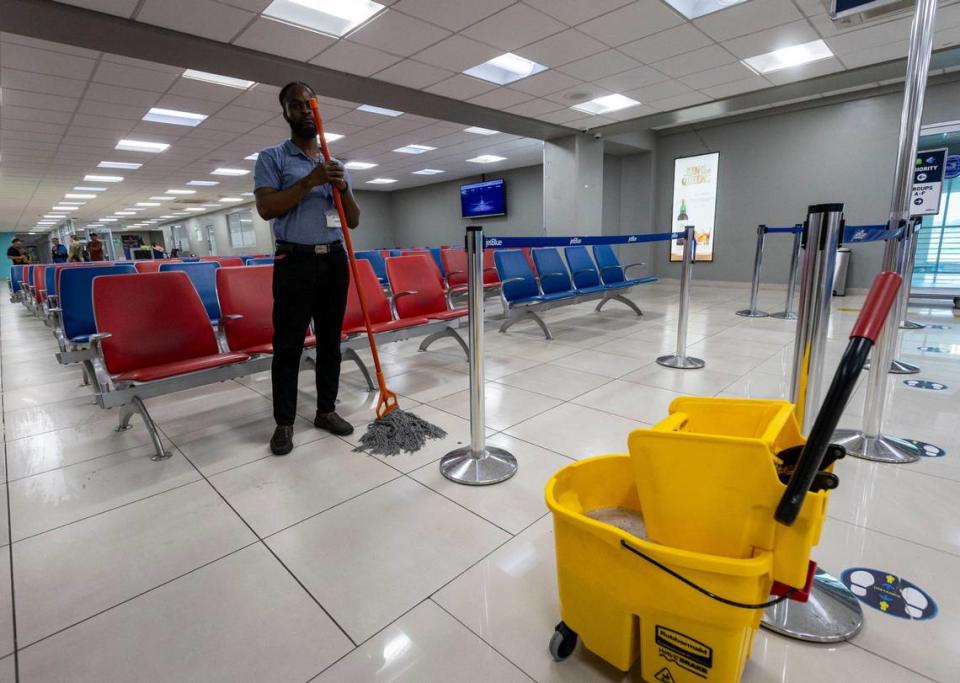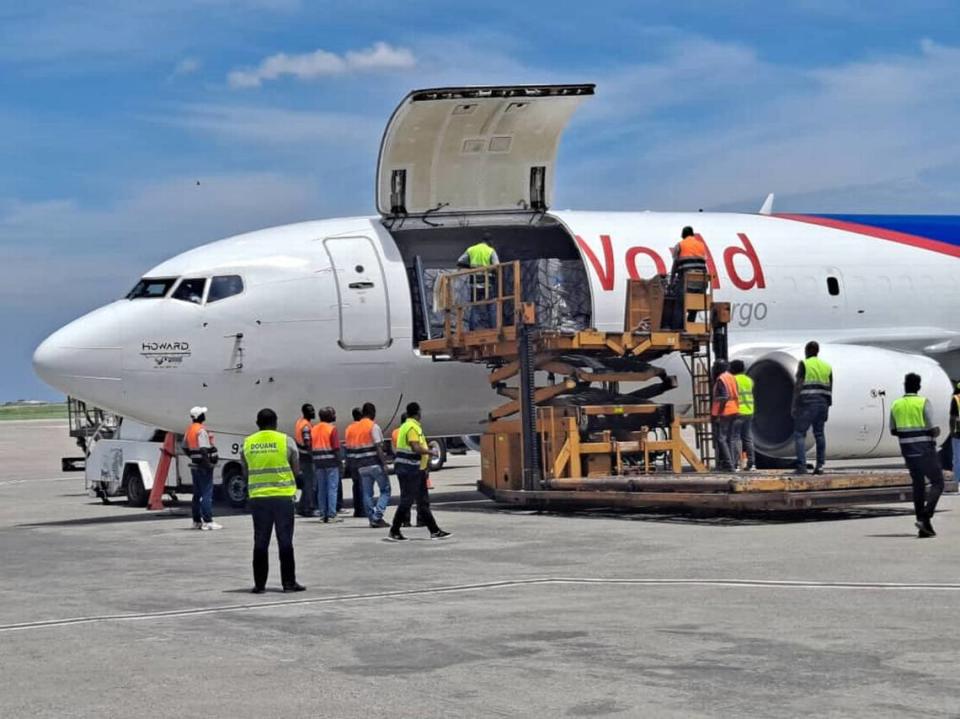Bodies of two young American missionaries killed in Haiti are returned home
The remains of two young American missionaries killed in Haiti by armed gangs were returned to the United States on Thursday on a Miami-bound American Airlines flight.
The bodies of Davy and Natalie Lloyd, both in their 20s, were flown through Miami International Airport from Port-au-Prince back home to their family in Kansas City, Missouri. The couple, married for only two years, were killed on May 23, along with Judes Montis, the Haitian director of their Oklahoma-based Missions in Haiti when armed gangs swarmed their compound and later set fire to a house where the three had taken refuge..
Their deaths have served as a reminder of Haiti’s ongoing struggle against the growing power of violent gangs, which has increasingly concerned a U.S. government eager to put a lid on the Caribbean nation’s long-running security crisis. The gang insurgency blanketing the capital has paralyzed all activities, and in early March led to the suspension of commercial flights by American, JetBlue Airways and Spirit Airlines, the three major U.S. airlines servicing the country.
On Thursday, American became the first U.S. carrier to restart operations between South Florida and Port-au-Prince.
Gianna Urgo, a spokeswoman for American Airlines, confirmed the transport of Davy and Natalie Lloyd’s remains. She said the airline was honored to do so and “extend our sympathy to their families during this difficult time.”
The Lloyds were killed north of Port-au-Prince in an area surrounded by several warring gangs. Getting their bodies out of the compound was a delicate operation that began the morning after their deaths when David Lloyd, Davy’s father and the founder of the mission, made arrangements for a funeral home in nearby Croix-des-Bouquets to travel to the crime scene and retrieve all three bodies.
The operation was confirmed to the Miami Herald and McClatchy by several sources, including Haitian police who are investigating the killings. After the funeral home pulled the bodies out of the incinerated home, they were delivered to a private ambulance service, HERO Client Rescue, which had been contacted by the Lloyd family.
A source involved in the rescue said that although the U.S. Embassy in Haiti was aware of the operation, which involved the ambulance crossing multiple gang territories and blocked roads, embassy personnel were not involved. The bodies were eventually transported safely to a private morgue. Since then the embassy had been working with the family to have the bodies returned to the U.S.
“U.S. officials in Haiti have worked around the clock to assist, in line with the families’ wishes, with making arrangements to transport the deceased and their personal effects back to the United States,” a State Department official told McClatchy.
AA flight 819 marked the resumption of service between Miami and Port-au-Prince by a major U.S.carrier in nearly three months. American, JetBlue Airways and Spirit Airlines all suspended their daily service into Haiti on March 4 after armed gangs targeted both Toussaint Louverture International Airport in the capital and the adjacent domestic airport, Guy Malary.

Since the suspension of commercial flights, Haitians and others visiting the country either had to wait it out in the capital or risk traveling through dangerous roads to leave Haiti either via the neighboring Dominican Republic or U.S. government chartered flights operating out of the smaller international airport in northern Haiti.
On Thursday, while the 156-seat American Airlines flight flying back into Haiti only had 18 passengers, the return flight to Miami was nearly full. Among them was a traveler who would only give his name as Lafontant. A resident of Croix-des-Bouquets, the same sprawling suburb where Missions in Haiti is located in the community of Bon Repos, he described daily life in the country as one of great uncertainty.
“In the morning, it can be calm,” he said, referring to the gang violence that has made the sound of automatic gunshots part of daily life. “But in the evening, it’s hot.”
“The gangs control everything and there’s no police to protect the people,” the visitor, who plans to stay in the U.S. for six days before returning to Haiti, said. “The situation is very scary.”

Like Lafontant, Walter Stocker, 84, also plans to return to Haiti. Stocker, who is Swiss and lives in Port-au-Prince with his Haitian wife, came to attend one grandchild’s graduation and to meet another one for the first time.
Stocker’s daughter, Carime Torres, 40, was among the family members waiting inside Terminal 4 for her father to step out.
“I’m very happy and very glad my father is able to leave Haiti,” Torres said before Stocker walked out after clearing Customs.
Torres said having both her father and her mother stay behind in Haiti hadn’t been easy.
“It’s been super hard,” she said. “It’s been a long three months.”
After walking out of the Customs area, Stocker hugged his daughter.
“I feel like I’ve been released,” said Stocker, who usually travels to the United States or elsewhere once a month. “It’s like I was in prison.”
American Airlines said it will continue to operate daily service to Haiti, but plans to monitor the security situation. JetBlue Airways, which operates flights out of John F. Kennedy International Airport in New York and Fort Lauderdale-Hollywood International Airport, says it plans to restart service on June 5. Spirit Airlines said it will resume its daily service between Port-au-Prince and Fort Lauderdale-Hollywood International Airport on June 6.
“We will continue to closely monitor the situation in Haiti and adjust our schedule as needed,” Nicole Aguiar, a spokeswoman with Spirit Airlines, said.
In addition to the landing of American Airlines on Thursday in Port-au-Prince, a charter flight brought desperately needed medical kits for the World Health Organization. The return of flights at Toussaint Louverture is something U.S. officials have been striving for, ever since armed gangs decided to target the structure in an effort to topple the government.
To protect the airport, members of the country’s small army were deployed to assist the Haiti National Police. The army is also patrolling the northern perimeter as part of the security upgrades the Haitian government has made since the gang insurgency. Those upgrades include spending more than $2 million to tear down homes that were being used by gangs to shoot at the runway.
Those upgrades were surveyed ahead of Thursday’s resumption of service by security consultants working for the three major U.S. carriers. The Transportation Security Administration also surveyed the airport to see whether U.S. flights could restart.

Getting Toussaint Louverture International Airport operational again has been a priority for the United States, which has assisted Haitian authorities in securing its grounds to prevent it from being overtaken by armed gangs.
While the Doral-based U.S. Southern Command, for example, has coordinated the arrival of military aircraft to show that it is safe and to bring supplies for the construction of a support base for a a multinational security force, the TSA has also assisted with equipment upgrades.
“TSA has spent numerous hours engaging with Haitian government officials and federal partners. TSA led a delegation of Haitian aviation community officials to TSA HQ, spent several days working on updated aviation security plans for the airport and for TSA to consider,” the agency said in a statement. TSA also provided important perspective on how decisions impact the overall security at Port-au-Prince airport.”
Miami Herald Caribbean Correspondent Jacqueline Charles contributed to this report.


